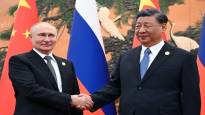MOSCOW/BEIJING President of Russia Vladimir Putin shows the importance of China to Russia by visiting China at the very beginning of his new presidency.
Putin arrives for a two-day state visit to China on Thursday. He meets the president Xi Jinping and the prime minister Li Qiang’s.
Why is Putin traveling to Beijing?
Heikki Heiskanen, Moscow:
The state visit emphasizes how vital a partner China is now for Russia. According to the constitution, a new government had to be formed when the presidential term changed, and it was assembled quickly before the trip to China. The composition is largely unchanged. Thus, there are ministers in the government who have already had time to establish relations with their colleagues in China.
In a statement given by the news agency to Xinhua in the interview Putin praised the peace plan presented by China. He said the principles put forward by the Chinese president are realistic and constructive. As usual, Putin accused Ukraine and Western countries of not wanting to negotiate.
What is the most pressing issue between China and Russia?
Mika Hentunen, Beijing:
A surprising drop in sales. Between countries trade has developed strongly in just over two years after the start of the Russian war of aggression. Last year alone, it grew by 26 percent. The total value of the trade in 2023 was around 240 billion dollars, and there is a lot of room for growth, at least in China’s opinion.
However, China’s trade with Russia dropped by 16 percent in March and 13.5 percent in April from a year ago.
The reason is apparently that US sanctions have begun to bite. Putin and Xi are expected to look for ways to circumvent Western sanctions.
Heikki Heiskanen, Moscow:
An important issue for Russia is increasing the export of natural gas. Losses in the European market have hit the revenues of the state-owned gas giant Gazprom hard. News agency Reuters calculations according to Gazprom’s gas exports to Europe fell by 55.6 percent last year, and the company made a loss for the first time since the 90s.
China’s negotiating position is strong. Financial news agency Bloomberg has told From the calculation made by the Russian Ministry of Economic Development, according to which Russia will have to sell natural gas to China 28 percent cheaper than to European countries until 2027.
Mika Hentunen, Beijing:
China currently buys most of the natural gas that previously went to the EU. China is interested in the new natural gas pipeline planned for Siberia, which the leaders are expected to discuss and possibly decide on.
Particularly interested China is currently on the status of its currency, the renminbi, at the Russian central bank. In two years, it has become Russia’s main foreign currency. About a third of all foreign trade in Russia is done in renminbi.
This fits with China’s long-term goals of elevating the renminbi past the dollar as the world’s most important currency and developing a competitor to the SWIFT banking system around it.
What unites Russia and China and what separates them?
Mika Hentunen, Beijing:
China and Russia oppose the US-led coalition of Western countries and even see it as their enemy.
However, China’s perspective is different and broader than Russia’s. It openly strives for the number one position in the world economically, politically and nowadays also in terms of the armed forces. It regards the United States as its main enemy in this struggle.
Xi divides the world geopolitically into the Global South led by China and the Global North led by the United States.
There is no clear answer to the question of where Russia is placed in this division in Beijing. It is emphasized here that Russia is a strategic partner for China, but not an ally.
It means that, for example, with regard to Ukraine, China does not want to get its hands dirty because of Russia, even though in practice it helps its war machine.
The role of a mediator in both the Ukraine war and the Middle East suits China’s foreign policy goals.
Heikki Heiskanen, Moscow:
The tightening of relations between China and Russia may be one of the biggest geopolitical consequences of Russia’s war of aggression in Ukraine. In the current circumstances, the Russian leadership seems to be ready to tolerate the fact that the country’s dependence on China is growing. At least China does not question Russia’s autocratic rule.
The Chinese leadership’s vision of the desired world order is sufficiently compatible with the world view of the Russian leadership. The Russian leadership wants to create the image that Russia and China represent the global majority, which is tired of being dictated to by Western countries.
How will Putin’s visit be followed in Russia and China?
Mika Hentunen, Beijing:
After the talks in Beijing, the leaders will travel to northeastern China’s Harbin, where they will open an export fair and participate in a ceremony celebrating the 75 years since China and the Soviet Union established diplomatic relations.
Putin is not really in the company of the people, because all the events have an invited audience. There are no press conferences, so the international media will have to rely largely on Chinese television and press releases.
Heikki Heiskanen, Moscow:
The Russian state media will certainly make the most of the state visit. It is important to show the citizens that the confrontation with the West has not left Russia isolated.
